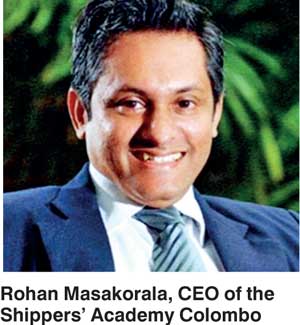Thursday Feb 19, 2026
Thursday Feb 19, 2026
Monday, 20 November 2017 00:00 - - {{hitsCtrl.values.hits}}
Intermodal Europe 2017 is a major event for any professional within the container shipping industry and will be held from 28 to 30 November in Amsterdam. Over 80 speakers and 6,000 participants are expected to attend the massive exhibition and conference which is held annually in Europe.

Rohan Masakorala, CEO of the Shippers’ Academy Colombo will be speaking at Future Outlook Forum that will discuss, where will the future challenges and opportunities come from and how can the market anticipate them? This forum will consider the medium and long-term issues to identify these challenges and opportunities, and discuss their likely impact. The speakers will focus on topics such as opportunities for hidden growth, container value fluctuations, de-globalising markets, the effects of Brexit and the impact of increasing automation.
Following extracts were released to the media by the organisers on an interview done with Rohan Masakorala on the subject of ‘Impact of de globalising markets’ for which he is listed to be the lead speaker. Rohan is the first Sri Lankan speaker to be invited to address this major European maritime and logistics event.
The 2017 sessions will cover the latest trends and innovations and will include the following forums: Worldwide Container Shipping Outlook; New Opportunities for Finance in the Container Shipping Sector; Cold Chain Forum: reefer container logistics and technologies; Future Opportunities: where will the next opportunities come from and how to anticipate them?; Container Value Fluctuations: how to ensure a stable investment environment; The Belt and Road Initiative: a boost for international trade; Maritime and Logistics Forum: getting it right for the customer; New Opportunities in the Container Optimisation Market: update & what to expect going forward; Alternative uses for the Shipping Container; Amsterdam Logistics Forum; Smart Shipping: The Internet of Things & Big Data in tracking, creating greater transparency in the shipping supply chain; Cargo Integrity: the fundamentals of safe packing & understanding the CTU code; Latest Developments in Container Weighing Legislation and Solutions and CLECAT Hosted Forum: empowering freight forwarders, shipping lines and the extended supply chain to reduce their carbon foot print.
Masakorala shared some insights ahead of the event. Following are excerpts:
Q: Can you provide an overview of your conference session deglobalising?
A: Future outlook – technology is creating game changers around the world and is changing consumer behaviour and how trade is flowing between manufacturers to customers, as a result the demand for services and the requirement of customers in trade transportation too is changing and the future customer trend is more technology and speed dependent. Understanding the changing demographics, expanding new markets and the current political winds are important as global managers need to plan and understand the future as much as possible to deliver superior and better services to sustain business growth
Q: Why is this an important topic to discuss?
A: De-Globalisation of markets: Internationalisation of global trade has continued its march forward for decades since the world war two ended. However due to the wealth distribution inequality, technology and innovation, has led to polarisation of societies in the developing world too. This has brought upon new political head winds of protectionism and promoting de globalisation by influential sectors and the leaders of the planet, it is important to understand this thinking which can have huge global implications for trade and transport.
Q: Describe your session?
A: My session will discuss global trends, and what has gone wrong in the current model; how to correct markets for better growth for global stability and to discuss new opportunities around the world.
Q: What would you say is the biggest issue being faced/discussed in your industry now?
A: Consolidation, capacity constraints and monopoly and the fear of anti-competitive behaviour of new business model that is emerging, handling protectionism and supporting trade and the future of the open market model.
Q: What do you think the biggest challenge for the industry will be in 2018?
A: The policy towards free trade and global security concerns are the two major factors that will continue for some considerable period as short-term solutions are not visible in the current context. This will challenge and hinder confidence, growth and affect trade if not addressed fast.
Q: What innovative measures should the industry adopt in the next few years to ensure market sustainability and growth? And what is the relevance intermodal EU 2017 to the industry?
A: The future customer trends are changing literally speaking the world is at once fingertips, and innovation should be focused on new B2C models where consumer needs can be changing even faster, the innovation should not be restricted to technology, but both human and infrastructure capacities to handle such technology should be enhanced for greater customer service and business development.
Intermodal EU brings ideas and thoughts from a cross section of the industry and provides a platform to understand each other better, discuss global markets and help develop new avenues for trade and transport to expand.